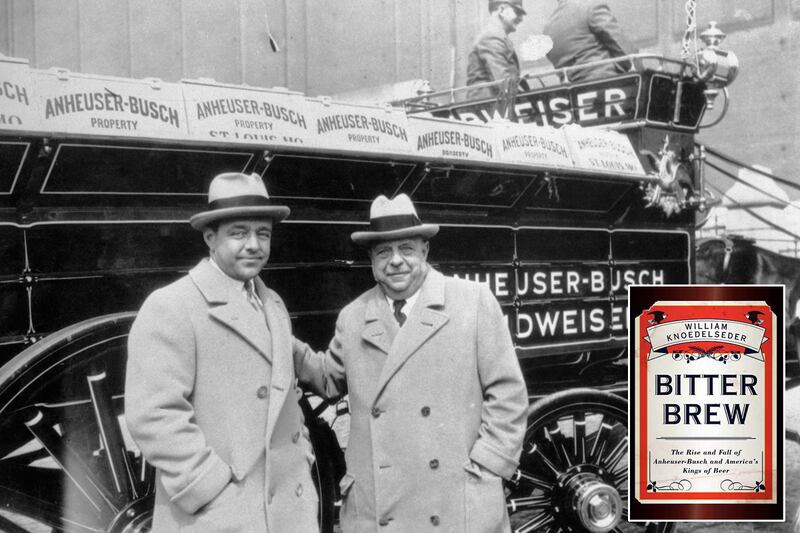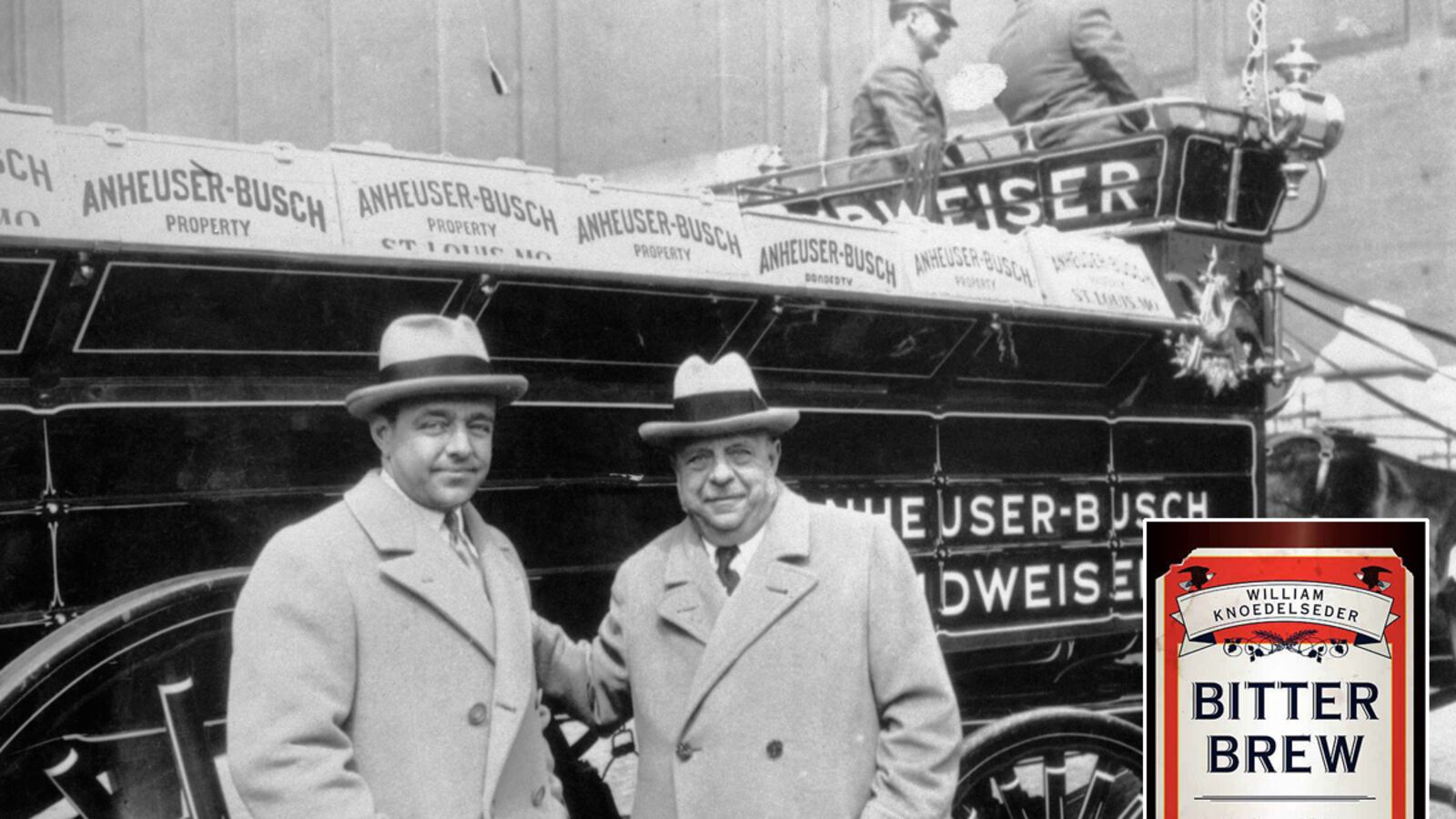The U.S. doesn’t have royalty. But it has had its share of drama-filled political dynasties (the Kennedys, the Bushes) and commercial ones (the Rockefellers, the Fords). It may seem odd for an economy built on creative destruction and competition, but a surprisingly large number of our best-known brands and consumer products were family companies for well over a century. In Bitter Brew: The Rise and Fall of Anheuser-Busch and America’s Kings of Beer, William Knoedelseder tells the story of five generations of Busches. Over a period spanning 150 years, the dysfunctional family constructed an empire in the heartland and imprinted itself on the popular culture. “Thanks to their beer, the Busch family had tasted all that America ever promised the immigrant class from which they sprang—wealth almost beyond comprehension, political power that provided access to presidents, and a lifestyle rivaling that of history’s most extravagant royals,” he writes.

In this engaging narrative, Knoedelseder, a veteran reporter and author, highlights the ups and downs of using DNA as the main criterion for the selection of CEOs. The Busch family corporate dynasty ended, as so many dynasties do, with an unqualified heir ceding control to savvy, aggressive foreigners. In 2008, Anheuser-Busch, then led by August Busch IV (and I use the adjective ‘led’ advisedly) was sold to InBev, a Belgium-based firm run by Brazilian managers.
Adolphus Busch came to the U.S. from Germany in 1857 as an 18 year old, found his way to St. Louis, got married, went to work for his father-in-law, Eberhard Anheuser, and started brewing beer. The decades after the Civil War brought the industrialization of food production, distribution, and marketing. And Busch was “the first brewer in the United States to pasteurize his product, which enabled him to bottle Budweiser and store it longer without fear of spoilage.” The railroads, which helped create a national market in goods for the first time, allowed small local businesses to build regional and national brands overnight. And the influx of Catholic immigrants from Germany and Ireland helped create a beer-drinking culture. By 1911, despite the best efforts of Protestant prohibitionists, “the U.S. surpassed Germany as the No. 1 beer producing country in the world,” Knoedelseder writes. Adolphus Busch died in 1913, the proprietor of a national beer company, and with an estate worth $60 million.
His son, August, Sr., piloted the company through the anti-German sentiment in World War I, and through the long, dry decade of Prohibition. Rather than close shop, the Busches decided to wait it out. The company diversified into related businesses like “rail cars, truck bodies, refrigeration cabinets, ice cream,” soft drinks and baker’s yeasts (which helped people make beer at home.)
With the company reborn after Prohibition, August Busch, Jr., known as Gussie, rode the wave of American big business in the middle decades of the century. He expanded the beer business rapidly, and in 1953 bought the St. Louis Cardinals, which he viewed as a way of promoting the company’s products. August, Jr., was angered to learn that the Cardinals didn’t have black players. ““How can it be the great American game if blacks can’t play?” he said. “Hell, we sell beer to everyone.”
The Busches were a very big deal in St. Louis, where they occupied a massive, Xanadu-esque family compound. Generation after generation, the fathers clashed with the sons, cheated on their wives, drank too much, spent freely on fast cars and fast women, and generally caroused. In the 1970s, August Busch, III organized a successful boardroom coup against his father, Gussie.
Trouble followed the family, and the family created its own share. In 1930, August A. Busch’s grandson was kidnapped. A young Busch daughter died in a horrific car crash. In 1976, a member of the family shot his best friend in the face. In 1983, August Busch IV, then a 19-year-old student at the University of Arizona in 1983, crashed his Corvette. The woman in the passenger seat was killed, and August IV left the scene; no charges were filed. Think of the Kennedys, except without the charm or the penchant for public service.
And yet Anheuser-Busch managed to stay on top in the U.S. market. It responded to changes in the marketplace (the rise of light beer, competition from Miller) with aggressive and frequently brilliant advertising campaigns: from “This Bud’s For You” to Spuds MacKenzie, from the Budweiser frogs to the Clydesdales romping through the Christmas snow. When beer sales slowed, it launched snack lines and invested in wine and bottled water.
Eventually, genetics and the world economy caught up with the company. Through the 20th century—the American century—it was enough for large companies simply to focus on the massive U.S. market. And Anheuser-Busch worked feverishly to maintain its 50 percent share of the U.S. beer market. But in the modern world, that simply isn’t enough. The company was slow to follow McDonald’s, Coke, and Pepsi into rapidly growing emerging markets. And rampant overseas growth meant that local beer companies could gain scale and sophistication. In the 1990s and early 2000s, Anheuser-Busch had looked beyond its border. It took a 10 percent stake in China’s Tsingtao, and a 37 percent stake in Mexico’s Grupo Modelo. But these were small steps.
Meanwhile, August III insisted on promoting August IV, the young playboy who was manifestly unqualified to run a convenience store, much less a huge beer company. In 1993, August IV was placed in charge of the Budweiser family of brands, the company’s crown jewel. “The promotions weren’t tied to any obvious accomplishments on his part,” Knoedelseder writes. August IV (known as the Fourth) seemed to view his life as an endless fraternity party. During a week of revelry with other executives in Key West, “they once sent someone on an emergency helicopter flight to Joe’s Stone Crab Restaurant in Miami after the Fourth complained that the crab claws that were about to be served at a large dinner party were too small.”
And yet, because the Busch family controlled the company, August IV continued to rise. In 2002, August III retired, and turned over the reins to a 60-year-old non-family CEO. The idea: in five years he would turn over the job to August IV. Why? “The most logical credible explanation was that even after all the heartache and embarrassment the Fourth had caused, and in spite of the disappointment, frustration, and rage that August felt, he still believed in his son,” Knoedelseder writes.
It is shocking that in the age of the internet, aggressive financial reporting, and investor activism that somebody with the personal baggage of August IV could become the CEO of a huge, publicly held multinational company. “For years, A-B had been protected by its size and stock price: it was simply too big and too expensive to be swallowed by a competitor,” Knoedelseder writes.
But things changed rapidly. The beer business was consolidating. Coors merged with Molson. SAB, based in South Africa, acquired Miller. InBev, based in Europe but run by Brazilian managers, was roaming around the world striking deals. Meanwhile, Knoedelseder reports, August IV was a clown show. At a distributors event in Washington, D.C., in May 2008, he slurred his words and had to cut short his speech. A few weeks later, InBev offered to buy Anheuser-Busch for $46 billion in cash. The deal was finalized in November.
The transaction caused a great deal of consternation in St. Louis, where Anheuser-Busch had been a paternalistic corporate citizen. And the new owners did cut costs and benefits. But really, Knoedelseder suggests, the company and the city were much better off having been liberated from the last of the Busch heirs. After the transaction closed, Knoedelseder writes, August Busch IV descended into a downward spiral of alcohol, drugs, women, and conspicuous consumption.





